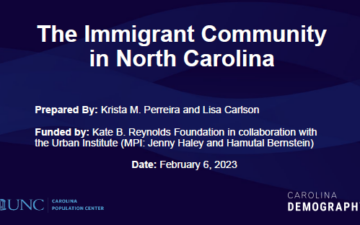NC in Focus: Marriage & Relationships

North Carolina households headed by a married couple or a householder with an unmarried partner. This represents 54% of all NC households.
Share of North Carolina households headed by a householder with an unmarried partner. This is lower than the national rate of 6.1%.
Among the state’s counties with populations of 65,000 or more, Wayne County had the highest share of unmarried-partner households (8.3%), followed by Lincoln (8.1%), Wilkes (7.5%), and Randolph (7.4%) counties. Chatham (4%) had the lowest rate of unmarried-partner households, followed by Cumberland (4.1%), Cleveland (4.2%), and Henderson (4.3% counties).
Share of North Carolina households headed by a householder with an unmarried partner of the same sex.
of North Carolina children lived in a household where there was an unmarried partner of the householder present. This is higher than the national rate of 7.8%.
Number of North Carolina residents age 15 and over who reported being married.
Average age, in years, of North Carolina’s married residents. Never married residents were, on average, much younger (29.3 years). Residents who were divorced or separated (53.1 years) or widowed (73.7 years) were, on average, older than currently married residents.
Share of North Carolina’s married residents who have been married for 60 years or more.
Earliest year of marriage reported by any married North Carolinian in 2017. There were an estimated 554 North Carolina residents (227 couples) who reported being married in 1939, meaning they had been married for 78 years.
Median duration (in years) of current marriage of North Carolina’s married population. This means half of NC married residents have been married for less than 19.5 years and half have been married for more than 19.5 years.
Number of North Carolina residents age 15 and older who report having been married three or more times.
Average duration (in years) of current marriage for North Carolina residents who have been married three or more times.
All data in this post were drawn from the 2017 American Community Survey.
Need help understanding population change and its impacts on your community or business? Carolina Demography offers demographic research tailored to your needs.
Contact us today for a free initial consultation.
Contact UsCategories: Carolina Demographics

The Center for Women’s Health Research (CWHR) at the University of North Carolina School of Medicine released the 12th edition of our North Carolina Women’s Health Report Card on May 9, 2022. This document is a progress report on the…

Dr. Krista Perreira is a health economist who studies disparities in health, education, and economic well-being. In collaboration with the Urban Institute, she recently co-led a study funded by the Kate B. Reynolds Foundation to study barriers to access to…

Our material helped the NC Local News Lab Fund better understand and then prioritize their funding to better serve existing and future grant recipients in North Carolina. The North Carolina Local News Lab Fund was established in 2017 to strengthen…
Your support is critical to our mission of measuring, understanding, and predicting population change and its impact. Donate to Carolina Demography today.